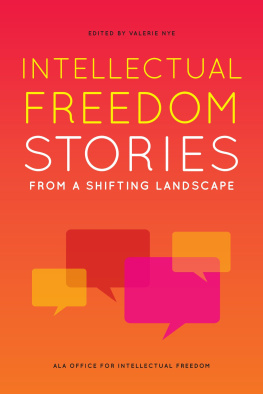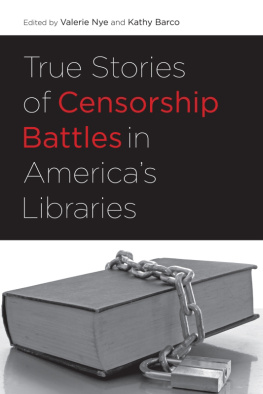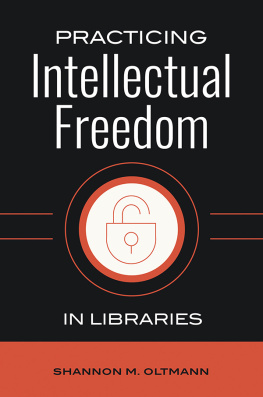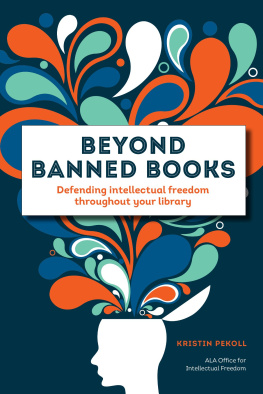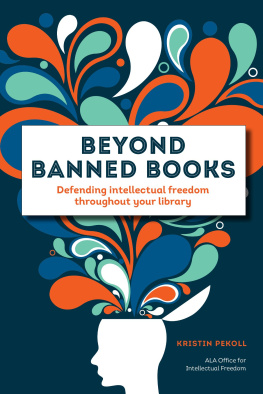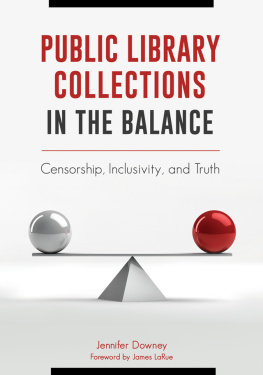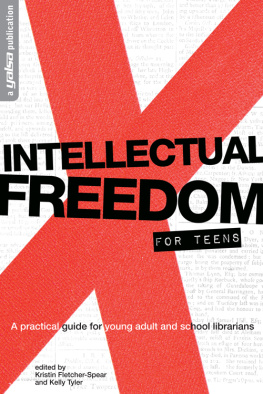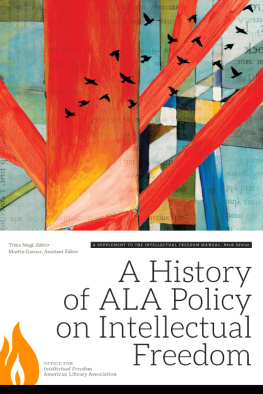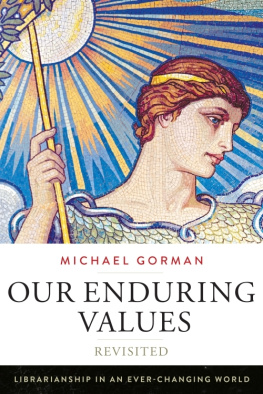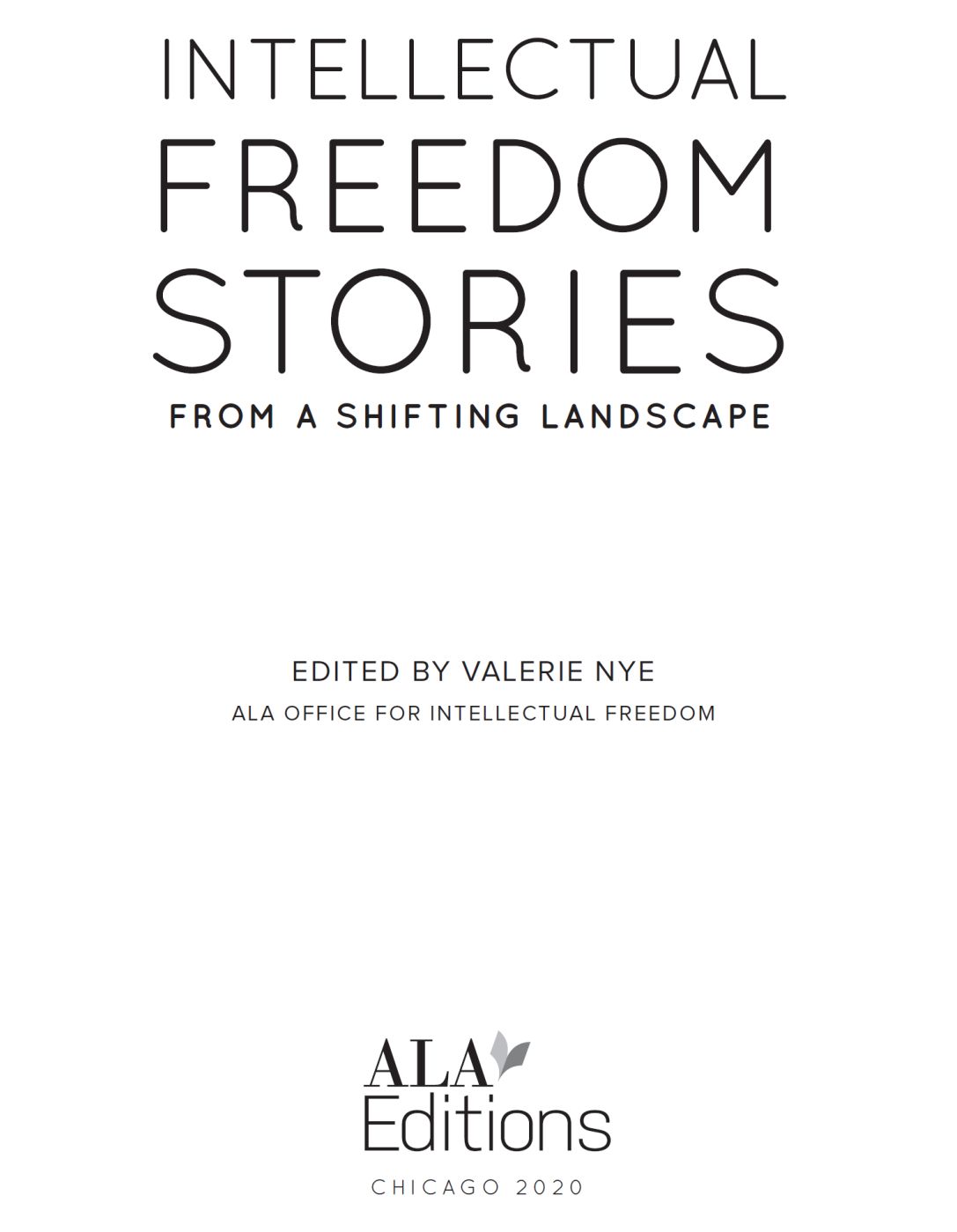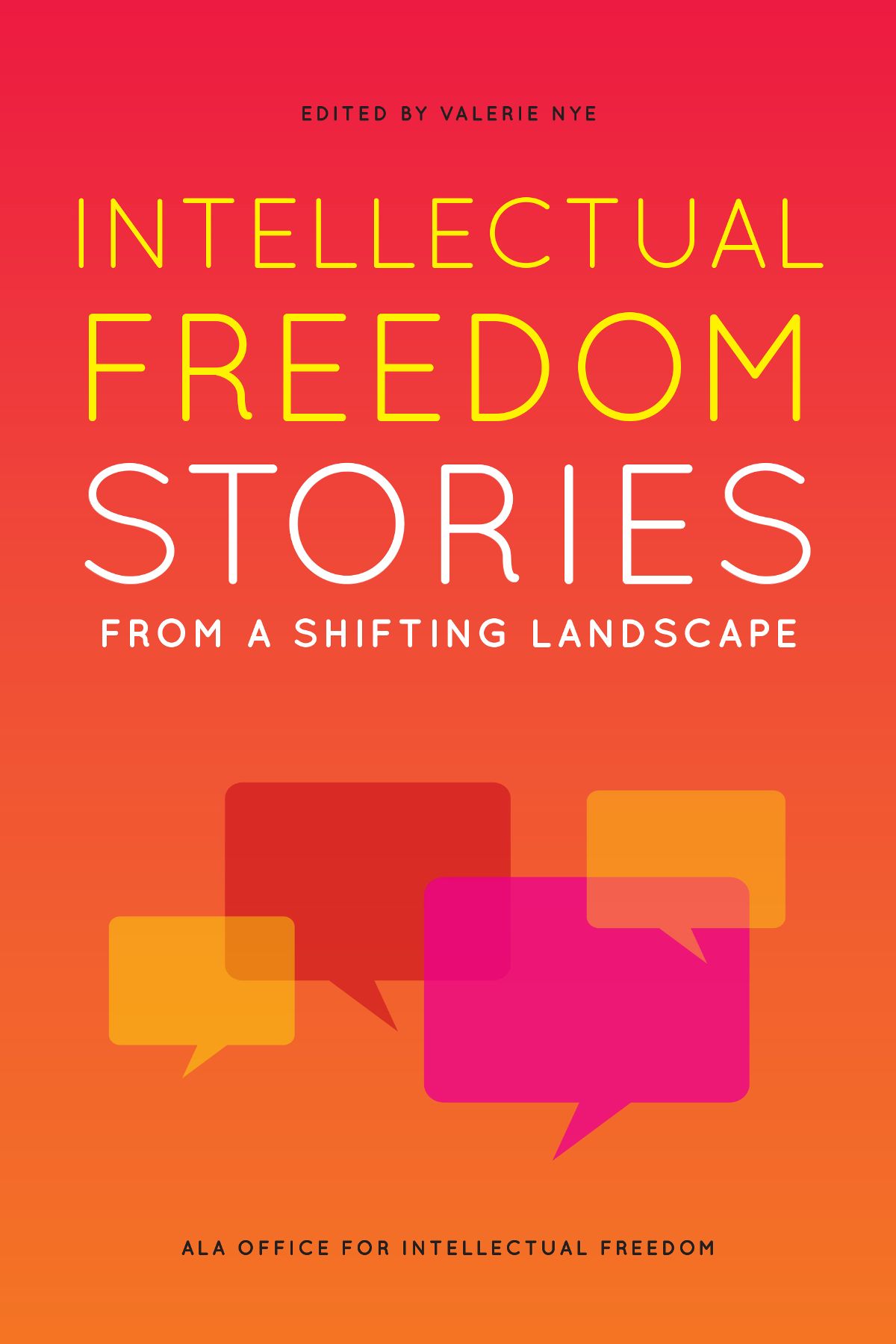
ALA Editions purchases fund advocacy, awareness, and accreditation programs for library professionals worldwide.
VALERIE NYE is the library director at the Santa Fe Community College. She previously worked as a library director at the Institute of American Indian Arts and as a library consultant at the New Mexico State Library, where she began researching and training others about intellectual freedom and banned books. She is the coeditor, with Kathy Barco, of True Stories of Censorship Battles in Americas Libraries, and of a literary research guide with R. Neil Scott, Postmarked Milledgeville: A Guide to Flannery OConnors Correspondence in Libraries and Archives. Valerie holds an MLIS from the University of WisconsinMadison.
2020 by the American Library Association
Extensive effort has gone into ensuring the reliability of the information in this book; however, the publisher makes no warranty, express or implied, with respect to the material contained herein.
ISBNs
978-0-8389-4726-5 (paper)
978-0-8389-4737-1 (PDF)
978-0-8389-4735-7 (ePub)
978-0-8389-4736-4 (Kindle)
Library of Congress Cataloging-in-Publication Data
Names: Nye, Valerie, 1971- editor.
Title: Intellectual freedom stories from a shifting landscape / edited by Valerie Nye.
Description: Chicago : ALA Editions, 2020. | Includes bibliographical references and index. | Summary: This book shares stories of censorship that librarians have experienced in their libraries. Those facing censorship challenges can find support and inspiration in this textProvided by publisher.
Identifiers: LCCN 2019055287 (print) | LCCN 2019055288 (ebook) | ISBN 9780838947265 (paperback) | ISBN 9780838947357 (epub) | ISBN 9780838947364 (kindle edition) | ISBN 9780838947371 (pdf)
Subjects: LCSH: LibrariesCensorshipUnited States. | Intellectual freedomUnited States.
Classification: LCC Z711.4 .I58 2020 (print) | LCC Z711.4 (ebook) | DDC 025.2/13dc23
LC record available at https://lccn.loc.gov/2019055287
LC ebook record available at https://lccn.loc.gov/2019055288
Dedicated to my mom, who taught me the importance of humility, working with others, and serving through community.
CONTENTS
Carrie Valdes
Megan Lotts
Sandra Parks
Raina Bloom and Carrie Kruse
Jennifer Stickles
Daniel Forsman
Leah Shlachter
James Allen Davis and Hadiya Evans
Shana Chartier
Erin Boyington
Lisa Hoover
Carme Fenoll Clarabuch
Tom Taylor
Rebekah Cummings and Peter Bromberg
Lorena Neal
Joan Airoldi
Rhiannon Sorrell
Lara Aase
Storytelling for Advocacy
C ommon misperceptions about libraries and librarians are legion: librarians read all day, all librarians are introverts, libraries are the perfect place to work if you dont want to talk to anyone. In reality, librarians rarely read on the job, some librarians live for karaoke, and librarianship is very much about communicating.
There is, in the history of the library profession in the United States, a long tradition of librarian storytellers telling a wide variety of stories to a wide variety of audiences. Early librarian storytellers spoke eloquently about the power of storytelling (i.e., the expression of oral narrative to listening group), particularly with children. In 1977, in the first edition of the classic text Storytelling Art and Technique, Augusta Baker wrote, Storytelling at its best is mutual creation. Through the stories themselves and through the interaction between teller and listener, traditional storytelling goes beyond the surface child to speak to the inner child, to recreate and nurture the human spirit.
Listening to oral stories is closely connected to the acquisition of literacy skills, the expansion of vocabulary, and the development of active listening skills, but there is more to storytelling than the pedagogical. Storytelling possesses an odd duality, being at the same time both the most complex and the simplest form of communication. Storytelling unites a disparate group of listeners divided by gender, ethnicity, age, and economic status through the shared experience of story. A room full of strangers becomes a community through the shared experience of a specific narrative. Stories told in libraries, told by librarians, have a particular persuasive resonance. Spoken narrativestorytellingis an effective, persuasive tool for advocacy.
In 2005 and 2006, political science researchers at the University of Michigan found that when people who believed misinformation, particularly political partisans of any category, were exposed to corrected facts in news stories they rarely changed their minds. On the contrary, they often became even more strongly set in their beliefs. Facts, these researchers found, were not curing misinformation: Like an underpowered antibiotic, facts could actually make misinformation even stronger. Most of us like to believe that our opinions have been formed over time by careful, rational consideration of facts and ideas, and that the decisions based on those opinions, therefore, have the ring of soundness and intelligence. In reality, we often base our opinions on our beliefs, which can have an uneasy relationship with facts.
If mindsets are not changed by facts and statistics, what changes them?
To persuade people, tell them a story.
Storytelling has been identified as an effective, indeed, perhaps the most effective, means of persuasion. The Wall Street Journal, the Harvard Business Review, even Forbes, trumpet the human minds affinity for storytelling. From the popular science of Jonathan Gottshalls The Storytelling Animal (2012) to the organizational acumen of Annette Simmonss Whoever Tells the Best Story Wins (2015), the message that storytelling is an effective persuasive tool has achieved traction in commercial marketing, business, journalism, and politics.
Stories are the way human beings make sense of the world. Storyteller Kendall Haven goes so far as to say, a significant part of what the brain does for the conscious mind is structure experience into story.
Scholar and storyteller Brian Sturm identifies the element that he calls the most profound and influential characteristic of storytelling: its power to entrance those who listen.
Uri Hasson, a neuroscientist at Princeton University, researches the neurobiology of storytelling and human communication. In a 2016 TED Talk entitled This is Your Brain on Communication, Hasson discusses the effect of group listening to oral narrative on the human brain.
Nevertheless, stories work to persuade and, luckily, libraries are seen as trustworthy sources of information. Telling the library story in its communityany library, in any communityis an effective way to build and maintain the consistently reliable support necessary for libraries to achieve maximum impact on their communities. Through organizational storytelling, librarians become advocates for their own cause and draw others into advocacy with them. Through true stories of positive experiences in the library, both those of patrons and library staff, librarians can communicate the essence of the ethics and values that guide the profession. Tremendous power lies in controlling the narrative, whether through anecdotal evidence or big data.
The core values of librarianship include imposing concepts such as access, democracy, diversity, intellectual freedom, and the public good, among others. These core values are abstract and intangible yet, ideally, they guide the library profession.
Next page
